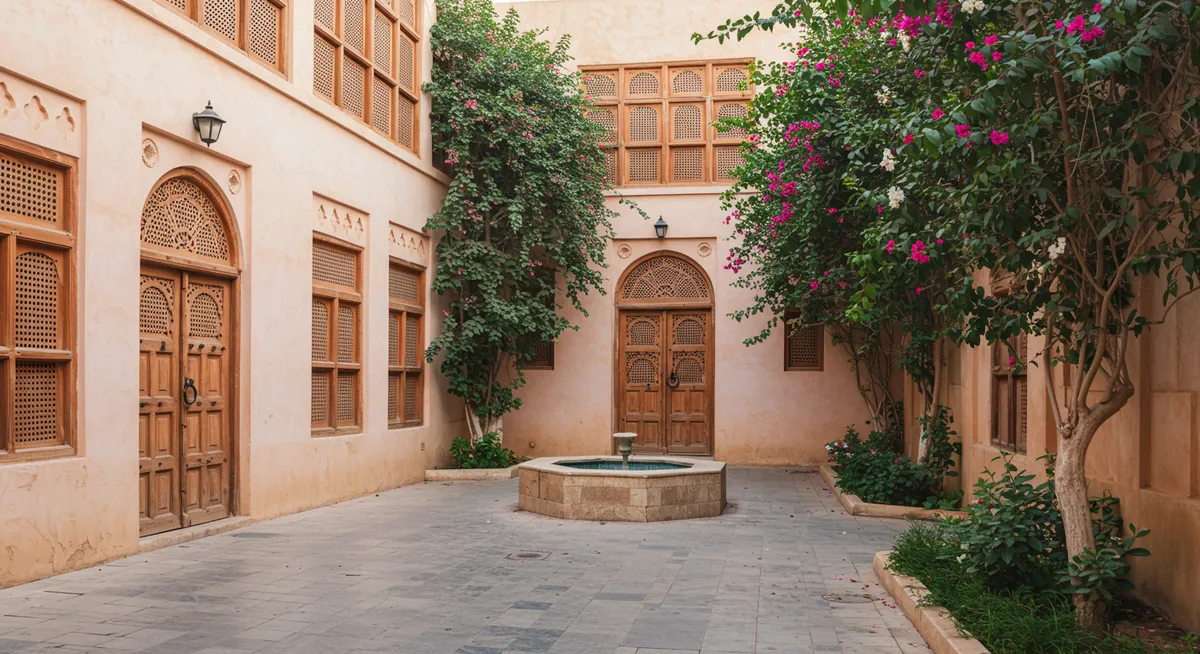
Manama's Hidden Bahraini Architecture
Table of Contents
Want to find the best travel deals for this destination? Chat with our travel hacking specialist!
Get Travel HacksCategory: traditional-bahraini-architecture-manama-hidden-spots
Unveiling Manama's Traditional Bahraini Architecture: Hidden Spots & Heritage
My personal journey through Manama's ancient alleyways has always led me to a profound appreciation for its architectural heritage. Bahrain, a nation steeped in pearling history and trade, boasts a unique architectural style that tells tales of bygone eras. Far beyond the modern skyscrapers, the real magic lies in uncovering the traditional Bahraini architecture Manama hidden spots, where the past whispers from every coral-stone wall and intricately carved door. This guide will help you navigate these timeless treasures, ensuring you experience the true soul of Manama by highlighting its most authentic architectural wonders. Discover the best local cuisine with our Manama food guide. Enhance your Manama experience with our Manama itinerary.
The Hallmarks of Traditional Bahraini Architecture
When exploring Manama, understanding the foundational elements of traditional Bahraini architecture is key to appreciating its beauty. Expect to see structures crafted primarily from local coral stone, often complemented by intricate gypsum carvings and sturdy wooden doors. A defining feature is the 'barajeel' or wind tower, an ingenious passive cooling system that channels sea breezes through homes. The emphasis was always on functionality meeting beauty, creating naturally cool interiors crucial for Bahrain's hot climate. My tip: always look closely at the carved motifs on older door frames; they often tell stories of the family who lived there, offering a unique glimpse into the building's past. Immerse yourself in local culture with our Manama cultural guide.
Discovering Hidden Architectural Gems in Old Manama
Venture beyond the bustling markets, and you'll find true traditional Bahraini architecture Manama hidden spots. The narrow lanes in areas like Al-Fadhel and the periphery of the Manama Souq conceal former pearling merchant houses and traditional family compounds. These historical structures, often tucked away down unmarked alleys, are a treasure trove for architecture enthusiasts. The joy of finding these hidden gems is immense; I once stumbled upon an amazing courtyard house just off the main souq by simply following a narrow, unassuming alley. Don't be afraid to wander off the main thoroughfares to truly experience Manama's historical buildings and their quiet charm. For a full list of authentic finds, check out our guide to Manama's Hidden Gems. Enhance your Manama experience with our Manama itinerary.
Beyond Residential: Mosques and Public Buildings
Traditional Bahraini architecture isn't confined to homes; it also graces many of Manama's mosques and old public buildings. These communal structures often incorporate similar design principles, including open courtyards, detailed stucco work, and strategic use of natural ventilation. The subtle beauty of a centuries-old mosque courtyard, often overlooked, offers a serene escape and a deep dive into traditional design and craftsmanship. Many smaller, active mosques welcome respectful visitors outside prayer times, offering a glimpse into their beautiful interiors and showcasing the enduring architectural legacy that defines the city's historical fabric. Consider visiting some of the Bahraini traditional cafes, many of which are housed in beautifully restored heritage buildings. Plan your perfect trip with our Manama itinerary.
Preserving Manama's Architectural Heritage
Efforts to preserve and revitalize traditional Bahraini architecture are increasingly visible across Manama. Numerous initiatives focus on restoring dilapidated heritage buildings, transforming them into cultural centers, museums, or vibrant cafes that offer a glimpse into the past. It’s inspiring to witness how these old residences and pearling houses are being lovingly brought back to life, retaining their original charm while serving new purposes. This commitment to maintaining Bahraini heritage buildings ensures future generations can appreciate the intricate artistry and unique character of the island’s architectural identity. You can often see this blend of old and new, even in areas highlighted in our Manama Street Art Guide.
Frequently Asked Questions
What are the key features of traditional Bahraini houses?
Can I visit these old architectural sites in Manama?
Are there guided tours focusing on Bahraini architecture?
Manama's traditional Bahraini architecture offers a compelling narrative of the island's rich past, a story etched in coral stone and intricate designs. By seeking out these traditional Bahraini architecture Manama hidden spots, you're not just observing buildings; you're stepping into the soul of the city. We hope this guide inspires you to peel back the layers of modernity and discover the timeless beauty that lies within Manama's historic heart. Embark on your own architectural exploration to truly feel the heartbeat of this ancient city, allowing its heritage to unfold before you.